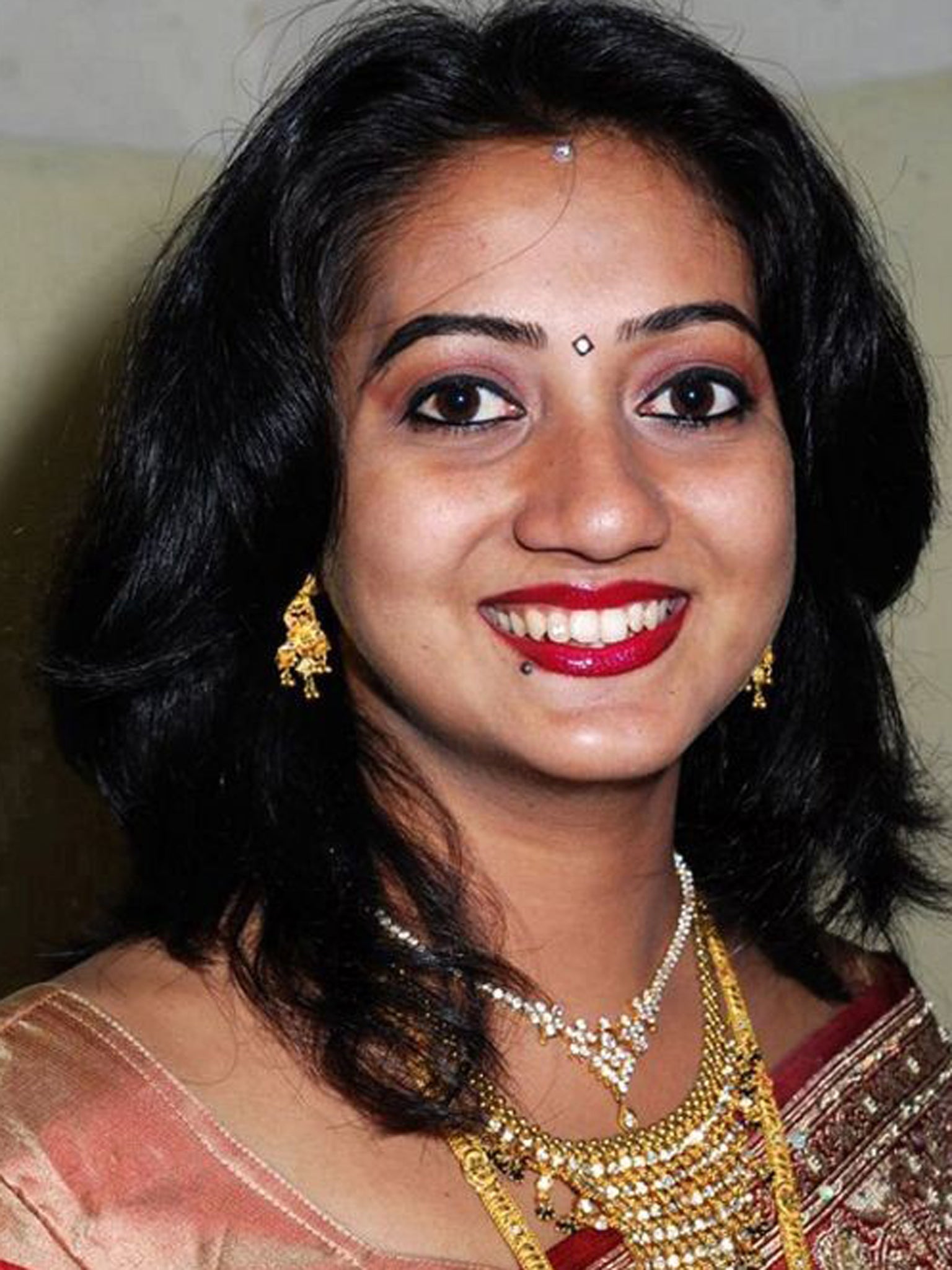Husband relives when his wife Savita Halappanavar asked for a termination, only to be told 'this is a Catholic country'
Inquest hears that dentist asked twice for an abortion and was denied on both occasions

The widower of an Indian dentist who died in hospital in Ireland after being denied an abortion on the grounds that “this is a Catholic country” yesterday told how he begged doctors to help her avoid a miscarriage.
Praveen Halappanavar told an inquest that a consultant refused to change her mind even though his wife, who was crying and in distress, pleaded that she was a Hindu and not an Irish citizen.
He was speaking in Galway at the inquest for his 31-year-old wife Savita, whose death last October was followed by domestic and international protests against the unclear state of Irish abortion laws. The case continues to attract international attention, with several inquiries into the death underway and new legislation promised.
Mr Halappanavar told the inquest that a consultant, Dr Katherine Astbury, twice turned down the couple’s requests for a termination, telling them this was because the foetus was alive.
Days after losing the baby his wife died of suspected septicaemia.
Mr Halappanavar said his wife was in pain, distressed and in shock, and had cried loudly after being told by a doctor that the cervix was open and that the baby would not survive.
He added: “Savita asked the doctor for a termination two times. She was in distress. She couldn’t take it. Dr Astbury said because the foetus was still alive she could not terminate it.”
Wiping away tears, he testified that on 23 October his wife had requested a termination for a second time. He went on: “Dr Astbury came in. Savita asked her, ‘Can you terminate the baby?’
“She said, ‘Unfortunately I cannot. This is a Catholic country. We are bound by the law. We cannot terminate the foetus when it’s still alive’.”
He said his wife, who was crying, told the doctor she was Hindu and that Dr Astbury had replied, “Sorry.”
When his wife finally miscarried, he said: “She was in shock again. I was wiping her tears. She was saying, ‘It was a girl, it was a girl.’ Savita was very confident it would be a girl. She already had finalised a name.”
He said his last words to her were that her parents – who had travelled home while she was in hospital unaware of the miscarriage or her illness – had arrived home safely.
The inquest heard how Mrs Halappanavar was moved to a high-dependency unit to recover, but her condition continued to deteriorate and she was eventually moved to intensive care.
Mr Halappanavar said he had sat with his wife when she died on Sunday October 28 after suffering multi organ failure from septic shock and an E-coli infection.
He said a nurse held his hand and asked ‘do you know what’s happening’. “I said yes,” he said.
He told the coroner and jury of six men and five women that he and his wife had moved to Ireland several years ago, explaining that “she found Ireland so peaceful compared to the hustle and bustle of India.”
Describing his wife as a very popular person both in India and Ireland, he said she was in excellent health, athletic and practised yoga.
The couple were delighted when she became pregnant: she had shed tears of happiness when she saw the baby on an ultrasound monitor at the hospital, he said.
The inquest is due to hear evidence from doctors and others involved in the treatment of Mrs Halappanavar.
The Irish government has already announced new legislation will be brought forward to clarify the country’s abortion law in the wake of her death.
The legislation will be combined with new regulations to clarify the circumstances, which many regard as confused, in which an abortion can be carried out where the mother’s life is at risk.
Opinion polls have indicated a major change in Irish public opinion, with 71 per cent now favouring new legislation and only 11 per cent opposed.
The law and how it will change
The Irish government has pledged to publish new abortion laws in July.
In current medical practice, doctors must treat an expectant mother and her unborn baby as equals.
This constitutional protection for the unborn child places a ban on abortion, but allows medical intervention to save the life of a woman in limited circumstances.
Doctors currently work under a combination of the law and guidelines set by the Irish Medical Council. The council’s direction states that, where rare complications arise during the care of a pregnant woman, a termination may be required at a stage where there is little or no hope of a baby surviving.
In such circumstances, doctors are allowed to intervene to terminate the pregnancy in a bid to save the mother’s life, while still making every effort to save the baby.
The new regime will provide clear procedures that will enable pregnant women to determine whether they are entitled to a lawful abortion.
The statutory framework will also provide a defence for doctors from criminal prosecution.
The reforms will not make abortion freely available in Ireland for purely social or personal reasons.
Alicia de Haldevang
Subscribe to Independent Premium to bookmark this article
Want to bookmark your favourite articles and stories to read or reference later? Start your Independent Premium subscription today.

Join our commenting forum
Join thought-provoking conversations, follow other Independent readers and see their replies